Someone once said “there’s no sunshine without coffee.” I tend to agree. However, there’s a great deal more to understand regarding the effects of caffeine – the central nervous system stimulant most people associate with coffee – and its effects on mental acuity, performance, etc. In this article I’m going to cover what people really need to know about this topic, so they can make educated choices.
The Basics….
Caffeine – a compound in the methylxanthine family – has its effects through various mechanisms on the central nervous system, and to be honest, I doubt those mechanisms are of great interest to most readers, so I won’t bother with an extensive discussion on it here. Suffice to say, caffeine positively impacts memory, performance, endurance, coordination and increases arousal, vigilance, while reducing fatigue, to name a few effects. Anyone who has used straight caffeine knows the stuff works, which is why the military, for example, adds it to gum as well as other things like bars and such. We all know the “energy drink/shot” category is all the rage these days even outside the gym setting. Although caffeine is not for everyone to be sure, it’s amazingly non-toxic. OK, so users of caffeine either know all this, or have at least experienced it, and don’t need much convincing it’s effective stuff for its intended uses. Let’s move into the more interesting info of this article, shall we?
Coffee Vs. Caffeine
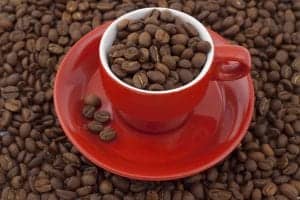
red coffee cup full of coffee beans
Here’s where things get interesting, at least to science nerds like me. Most people think of coffee and caffeine as essentially interchangeable terms with the same effects. However, caffeine and coffee have different effects and when we discuss the various positive effects of caffeine on performance or mental acuity, we are in fact talking about straight caffeine vs. coffee. That reality often comes as a surprise to many, but it’s true. Caffeine and coffee have different effects and it’s straight caffeine that has the pronounced effects on performance, mental acuity, and others briefly outlined above.
Studies have been carried out that used coffee matched for caffeine content vs. pure caffeine, and find it’s the straight caffeine that has the major impact on what we all generally associate with caffeine. Probably the most extensive study that compares coffee to caffeine was entitled Metabolic and exercise endurance effects of coffee and caffeine ingestion (1). This study found in a nutshell:
“…This study was designed to compare the metabolic and exercise endurance responses to the ingestion of the same amounts of caffeine as a coffee beverage and as pure caffeine with water. The caffeine was consumed in the same volume of coffee or water in the same period of time. It resulted in very similar plasma concentrations of plasma methylxanthines [meaning the caffeine appeared to be absorbed equally from the different sources], but only when it was consumed independent of coffee was there an enhancement of endurance. In addition, in this trial the initial impact on circulating epinephrine [adrenaline] concentration was greatest. Thus it appears that some component(s) in coffee interferes with the normal ergogenic response of caffeine.”
So for the non-science readers, what does the above mean? Essentially, coffee matched for caffeine content to caffeine capsules failed to have the same effects on adrenaline response (feeling “jacked up”) and endurance as straight caffeine. “Why is that, Will?!” is the obvious thought you have! No, I’m not a mind reader, just the obvious question.
Coffee is a complex biological substance with literally hundreds of compounds that are dissolved along with caffeine during the brewing process, all of which ends up in your coffee mug. Some of these compounds have effects completely separate from caffeine, and more important to this article, effects that appear to counteract the effects of caffeine, which is a positive or a negative depending on how you view it. Besides the more obvious stuff found in coffee (e.g., lipids, carbohydrates, and proteins) you find compounds of potential metabolic importance, such as nicotinic acid, opiate-receptor antagonists, and cholinomimetics (agents that exert an effect “opposite” to adrenaline). Interestingly one group of researchers isolated a cholinomimetic compound from both regular and decaffeinated coffees that, when injected into rats, resulted in decreases in heart rate and blood pressure. Thus, a compound that has direct counter regulatory effects to that of caffeine (and adrenaline). Coffee has all manner of potential health benefits, while caffeine has unique effects when taken in isolation as it pertains to performance.
Additional support for that is the fact these researchers also added pure caffeine to decaf coffee matched for dose to straight caffeine, and the effects were still inferior to caffeine alone on performance as well as other effects one usually associates to coffee vs. caffeine. According to the researchers from the above paper, “One possibility to account for this difference is that one or more of the multitude of compounds in coffee beverages antagonize the actions of caffeine, resulting in a reduced response.”
We know what the caffeine antagonist is in tea (from Camellia sinensis—the leaves that make white, green, oolong, and black teas). It is called L-theanine and you can buy it as a stand alone dietary supplement, and it’s also in some “relaxing” drinks and supplements. L-theanine combined with caffeine reduces both the blood pressure elevation and the alertness boosting effects of caffeine alone (2). Finally, a study just published in the journal Frontiers in Behavioral Neuroscience further supports coffee and caffeine differ in their effects on our brains. The study found that while caffeine alone only partially reproduced the effects of ingesting coffee; caffeine boosted areas of the brain that make one feel more alert as expected, yet coffee brought additional effects on brain areas that affect working memory and goal-directed behavior. The conclusion is the overall mental benefits people experience from drinking a cup of coffee was not replicated with caffeine.
Caffeine Content of Coffee
As the previous section outlines, if you want to enjoy your cup of coffee because it tastes good, and gives you a coffee buzz – that’s likely due to a variety of naturally occurring compounds in the coffee in addition to the caffeine – go for it. Of course, I and others add Alpha Joe Coffee Booster which makes a mug O coffee go from good to great…I won’t be giving up my mug of strong morning coffee any time soon. However, if you are looking specifically to get the known effects of caffeine on performance, increased alertness, etc., use straight caffeine.
Even if you are attempting to drink coffee for its caffeine content, that’s a hit or miss strategy. Researchers visited a variety of specialty coffee store for 6 consecutive days and tested a wide range of coffees and found the caffeine content varied considerably (3). According to these researchers:
“There was a wide range in caffeine content present in caffeinated coffees ranging from 58 to 259 mg/dose. The mean (SD) caffeine content of the brewed specialty coffees was 188 (36) mg for a 16-oz cup. Another notable find is the wide range of caffeine concentrations (259-564 mg/dose) in the same coffee beverage obtained from the same outlet on six consecutive days.”
So the same cup of coffee purchased from the same vendor (Starbucks) over six consecutive days ranged from 259 to 564 mg of caffeine!!! That’s like power gulping 3.2 to just over 7 small cans of Red Bull®—over 15-30 minutes (see below). If you want to try and experiment to confirm what the earlier mentioned study found regarding the different effects coffee has from straight caffeine, try 600mg of pure caffeine some time. Your head may explode, but you will never doubt again what an equal amount of caffeine feels like that can be found in a really strong cup of coffee.
So What About the Energy Drinks?
The “energy drink” category is all the rage these days, and cans of Red Bull and others of the ilk fly off the shelves. This has proven to be a very profitable market segment for sellers of these products. There’s nothing inherently problematic with them, but to get your 80mg of caffeine (the dose listed for Red Bull for example) you have to ingest additional stuff you may not want, be it sugar, various synthetic sweeteners, etc. and you are paying an exorbitant amount per serving compared to what you get from them. Bang for the buck, these products are generally a poor deal in my view.
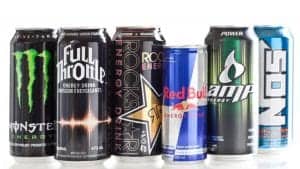
Various Energy Drinks On The Market
The same researchers who measured the caffeine content in coffees did a separate study and examined the caffeine content of a variety of sodas and energy drinks. Sodas such as Coke Classic had similar caffeine content to those energy drinks at the lower end of their caffeine content, such as KMX, which had 33.3mg of caffeine to Coke Classic’s 29.5mg but the caffeine content could vary. Interestingly, they found just 67mg of caffeine in a small can of Red Bull, a drop from the 80mg that is claimed to be inside (4) They summarize their findings:
“The caffeine content of 10 energy drinks, 19 carbonated sodas, and 7 other beverages was determined. In addition, the variability of the caffeine content of Coca-Cola fountain soda was evaluated…The caffeine concentration of the caffeinated energy drinks ranged from none detected to 141.1 mg/serving. The caffeine content of the carbonated sodas ranged from none detected to 48.2 mg/serving, and the content of the other beverages ranged from < 2.7 to 105.7 mg/serving.”
Take home is, I don’t have any beef per se with the energy drink/shot category of products, but I also don’t see them as a value for the money spent considering what you get, and I don’t like the taste of most of them (which admittedly is a subjective experience) and for me, they don’t make sense to spend money on.
Cost effective Caffeine
OK, so coffee is great stuff, but does not deliver the true caffeine experience, and energy drinks are, in my view, an overly expensive and unneeded method of getting caffeine. What next? A product called Fein came on my radar a while back while at a show. I asked for some samples, tried it, and liked it It’s simplicity at its best: an inexpensive, essentially tasteless, easy to use way of getting pure caffeine when I want it—and it has zero calories and no artificial ingredients. It comes in a tiny packet of powder which can be used when and where I need it, and it was inexpensive to boot. Unfortunately, Fein is no longer for sale it appears, but there’s other caffeine products out there for cost effective caffeine.
Effective doses of caffeine varies widely with people, so some experimentation is needed. One study showed that a dose of pure caffeine as low as 12.5mg—in regular caffeine users—improved mental function. Generally speaking, for those who have been exposed to caffeine before – which is most human beings on the planet – 75 to 100mg is a good starting dose in my experience. Those particularly sensitive to stimulants, might try 25-50mg to start.
Obviously caffeine is a stimulant and, as with all stimulants, has its possible drawbacks, like insomnia if you take it too late in the day. Although caffeine has been shown to be exceedingly non-toxic, general warnings apply (like check with your doc before you take it if you have high blood pressure, are taking psychiatric drugs, or are pregnant), so make sure caffeine is right for you before proceeding.
Conclusion
Many make the mistake of viewing coffee and caffeine as interchangeable, and that’s clearly not the case. Caffeine appears superior when mental focus and performance is the goal, coffee the better choice for overall health benefits and a smoother experience, not to mention it tastes great. Those who already love a good mug of coffee, will find they’ll never go back to regular coffee once they start drinking Bomb Proof Coffee.
See you in the gym!
Cites:
(1) Graham TE, et al. Metabolic and exercise endurance effects of coffee and caffeine ingestion. J Appl Physiol 1998;85:883-9.
(2) Rogers PJ, et al. Time for tea: mood, blood pressure and cognitive performance effects of caffeine and theanine administered alone and together. Psychopharmacology 2008;195:569–77.
(3) McCusker RR, et al. Caffeine content of specialty coffees. J Anal Toxicol 2003;27:520-2.
(4) McCusker RR, et al. Caffeine content of energy drinks, carbonated sodas, and other beverages. J Anal Toxicol 2006;30:112-4.
(5) Smit HJ and Rogers PJ. Effects of low doses of caffeine on cognitive performance, mood and thirst in low and higher caffeine consumers. Psychopharmacology 2000;152:167–73.
Will Brink is the owner of the Brinkzone Blog. Will has over 30 years experience as a respected author, columnist and consultant, to the supplement, fitness, bodybuilding, and weight loss industry and has been extensively published. Will graduated from Harvard University with a concentration in the natural sciences, and is a consultant to major supplement, dairy, and pharmaceutical companies.
His often ground breaking articles can be found in publications such as Lets Live, Muscle Media 2000, MuscleMag International, The Life Extension Magazine, Muscle n Fitness, Inside Karate, Exercise For Men Only, Body International, Power, Oxygen, Penthouse, Women’s World and The Townsend Letter For Doctors.
He’s also been published in peer reviewed journals.
Will is the author of the popular e-books, both accompanied by private members forum access , Bodybuilding Revealed & Fat Loss Revealed.
You can also buy Will’s other books on Amazon, Apple iBook, and Barnes and Noble.

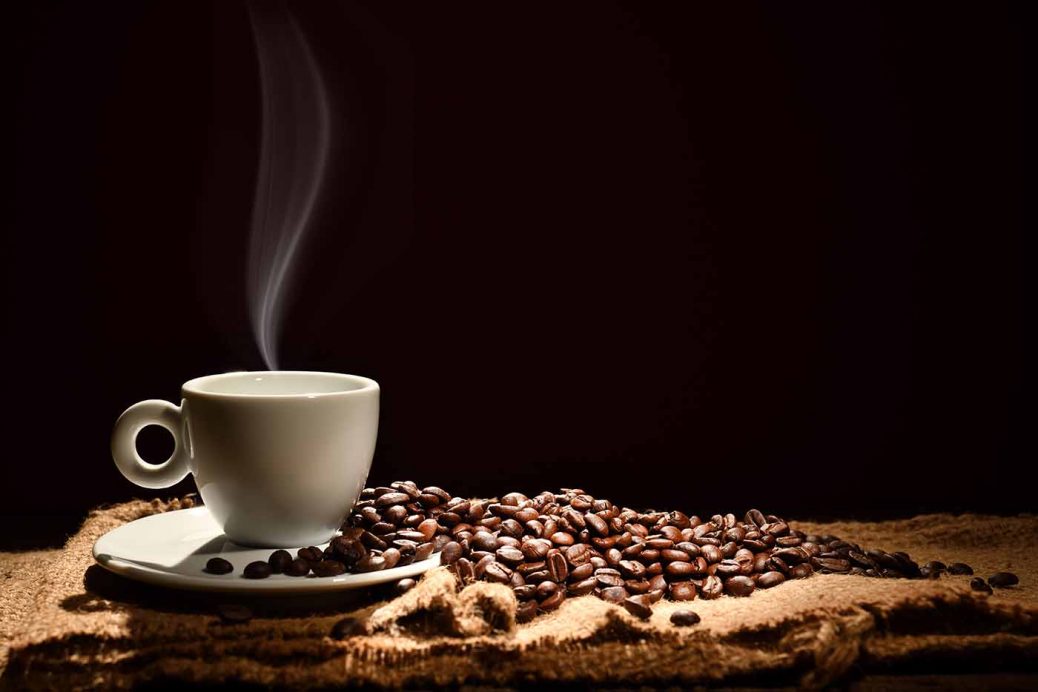
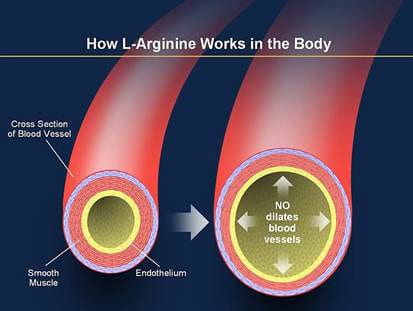
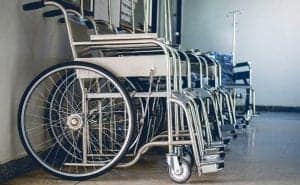
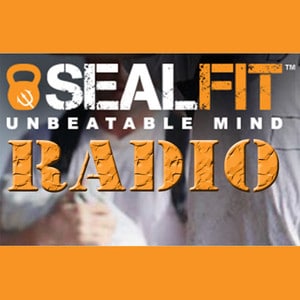
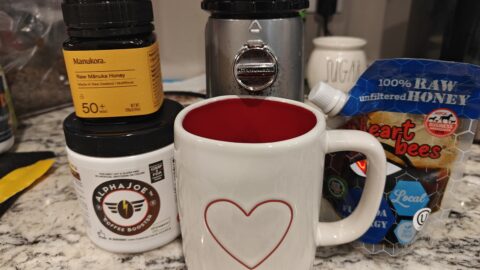
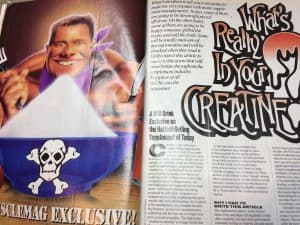

Thanks for the article Will!
I’ve recently started drinking coffee over the last month for some extra energy/alertness, but it’s “acquired” taste is disgusting at the moment. I’ll try this Fein you speak of. Thanks
Wow, never would have thought
Good article Will. Thanks for the tip. I ordered a box to give it a try.
Sounds good Bill!
Bill, Thanks for this very interesting article. My question is: should your fry Fein if you are hypertensive?
Thanks for your comeback. Regards Eddie
You’re kidding right? Do yourself a favor, ask your doctor treating your hypertension if you can take caffeine supplements in pill form. If he/she doesn’t smack you in the head, find another doctor… fast!
If you’re on meds for hypertension, and its well controlled, most MDs will say one 8oz. cup of coffee a day “may be permitted”, but no more.
Your primary goal should be to do everything you can to reverse your hypertension. Easier said than done, but it can be done. I’m no expert on hypertension, never had it, never want to have it. You might say I was “pre-hypertensive” years ago, when my BP was a little high. I went off caffeine completely, along with other lifestyle changes. Didn’t like it much as I grew up drinking coffee, and still today love just the smell of it. But it had to be done. Hypertension can be a deleterious disorder, I’m sure you’re well aware of that.
Good luck & good health to you.
nice article, will. i´ve read some of your reports and articles and i still couldn´t find anything about the interaction between caffeine and creatine. does caffeine dininish the effects of creatine?
I wouldn’t worry about it Jose, one study found the effect, but no follow up studies found it. I consider it a non issue at this time.
still, the company which manufactures creapure advises you on their site not to consume too much caffeine while taking creatine…. me confused now 🙂
What about No Doz or Vivarin. I use these some times to get caffeine. Is that a good option?
Caffeine is caffeine, so if you prefer it in pill form, that’s fine too.
A fan of NoDoz. While 75mg for 50 cents is a good deal for Fein. One gets 200mg for 5 cents or less in NoDoz, Vivarin, or generic knock offs. Talk about cheap and effective!
Awesome, very enlightning article Will,
Unfortunatelly i have tried caffeine on its own and the buzz is just too much for me, i get really nervous, cant think straight, even worse when working with weights, i just cant respect my resting periods and have to get straight into the next set wihtout proper rest, not getting the best out of it..
All of this doesnt happen when i use normal coffee, wich i allways do before i workout, i get more awake and ready to workout, but not nervous at all..
Thanks for letting me know why 😉
Did you take any money from Fein? Caffeine citrate is actually half as effective as base caffeine found in No-Doz and Vibarin. And those are cheaper and easy to crush to add to drinks.
What do you mean exactly by “half” as effective? Can you supply me the data for the statement showing when matched for caffeine dose the version of caffeine in No Doz is 50% more effective?
http://en.wikipedia.org/wiki/Caffeine_citrate My ?
A Wiki page is not a scientific cite and that page does not say what you think it says. Just sayin’… 🙂
This is a common mistake/ misperception. No offense Robert, but most people don’t know how Wiki works.
Great article, but you forgot to add that coffee is extremely acidic and therefore detrimental to the digestive system. Pure caffeine is far better for you, as long as you’re getting it from a reputable supplier.
Interesting article Will – thanks. One question: if caffeine raises adrenaline levels, would that give mean it tends to stimulate catabolic activity? If so, then I’d assume ectomorphs – already prone to easy “catabolization” – might be better off staying away from caffeine – or maybe getting their dose through green tea for the moderating effects of L-theanine….
Any thoughts about that?
Hi Will.
Glad you posted this article as I have been using “Fat Burners” and have been contemplating whether I should stop. I only use them becasue as a runner, I could not get up drink a cup of coffee, and go run. It was upsetting my stomach too much. I purchased Green Tea Fat Burner because it was all natural, inexpensive, and had 80mg of caffeine per serving. The dilemma is that I do not need to burn fat and I am actually trying to put on muscle. I am very lean but I like doing my morning cardio with it. Is it okay to take 80mg of the green tea caffeine?
i’m sensitive and an almost regular user of caffine. start with 15mg, you can always add to it. 30mg can have me rockin’ n rollin’ all night.
I *hate* coffee. If I drink it, it needs to be flavored to death. lol I just use No Doz. 200mg per capsule works miracles for me!
Fey sounds great but I am not sure to find it here in Spain. I just wanted to ask if those tablets that are sold as fat killers that contain green tea, guarana and/or caffein may be also similar in their effects. Thanks
Awesome information. Thank you so much Will.
Response to Mr A
Your ‘cap’ ideology might be easier (and work for you), however there are those who prefer NOT to pollute the body with ‘fillers’ that are used to create the cap.
What about caffeine tablets?
Hi Will,
Thanks for going in-depth about this very popularly consumed compound. Would you mind answering a few questions I have about my consumption:
1. For some reason, I can’t take any sort of (legal) stimulant (including caffeine). I feel good for about 30 minutes, then am completely restless, anxious, etc. for the next twelve hours or so. Can you explain it?
2. If I can’t have any thing that will bring me up, what alternatives do you suggest? (I feel very jealous that 98% of the population can handle caffeine and use it as a sleep substitute, energy booster, weight loss aid, etc.; but, I can’t).
(I heard Rhodiola might be a good substitute).
Thanks,
John Smith
Hey John,
Replying to you just to point out that no one, in their right mind, uses caffein as a “sleep substitute”. Except maybe some desperate college students, for a short term. Bad idea. Get your sleep.
There seems to be a wide variety of tolerances for caffein. I drop 12 cups of black coffee every day, and sometimes feel drowsier after the later cups. This great article by Will is offering some possible explanation. But your answer is what’s stated elsewhere here. Just lower your dose to whatever doesn’t bother you. And choose a direct dose product like No-dose, or this Fein stuff, which is news to me, to actually know what the dose is.
Thanks Will. Eye opener. May be trying fewer cups of coffee, and experimenting more with the straight stuff.
What the hell would we do without you, Will? Thanks for the legwork!
Great article on Caffeine, I’d like to try the FEIN product. I enjoy my coffee early in the day, I work out in the evenings and thats when I’d like to try Fein. Can I get this in Canada?
Hi, why is it that caffeine livens me up for over 16hours each time I drink a cup of coffee? I have been known to stay awake for several days when drinking coffee. Decaf is also not much good. I love coffee, but must sadly decline to drink same anymore. I am 73 years of age. I have found decaf of up to 99% recently. Some of these coffees are tasteless, others are saturated with flavorings that are over powering and/or decent to drink. Teas have the same effect on me.
I have been surfing on-line greater than 3 hours nowadays, yet I never discovered any interesting article like yours. It?s lovely worth sufficient for me. In my opinion, if all website owners and bloggers made just right content as you did, the web will probably be a lot more useful than ever before.
super article! realy helps, thanks
Hey Will,
I don’t have any particular bias here but will throw this out.
Since we really don’t know what’s going on here, perhaps Dave Asprey is correct in claiming that the problem with coffee is mycotoxins? This study shows 90%+ of the Brazilian beams tested positive for mold.
http://www.ncbi.nlm.nih.gov/m/pubmed/14726276/
I cover Bullet proof coffee here if interested, but those claims were shown false repeatedly as have all major claims for it. Note the study you link to is using unprocessed beans. During processing, mycotoxins are removed and coffee manufacturers have known about that a long time,
I use an energy shot (not an energy “drink”), which I notice has a very good effect vs. coffee as well and are relatively cheap (mine are less than $1 per shot from Amazon.com — I use Red Rain). I had thought its strong effect was because it had other ingredients in it, e.g. taurine and choline. However, maybe it’s just not got the stuff that coffee does. I’ll try straight caffeine to see but I’d love to hear your researched opinion on it sometime. Thanks
BTW, you can get a much cheaper caffeine dose by just going to Amazon and typing “caffeine.” I found Serious Nutrition Solution Caffeine 200 mg tablets going for 5 cents each. I am going to order a bottle I’d like to hear your thoughts about those vs. “Fein”. Thank you.
Per comments above, you can use No Doze or any caffeine, but I like being able to turn what ever I;m drinking into an energy drink added to other stuff in my pre workout drink.
You have to be careful with what you buy on Amazon. When Will first talked about Fein I searched Amazon for caffeine powder and found someone selling pure caffeine powder, not dosed in capsules. I couldn’t find it listed anymore which is probably a good thing. If you had pure caffeine sitting around in a container and someone mistook it for sugar or flour or something you could easily give yourself a very lethal dose. I’m guessing a heaping teaspoon could easily weigh 10 grams (not milligrams), enough to be lethal. According to wikipedia 150 to 200 milligrams per kilogram of body mass is the median lethal dose.
The LD50 (lethal dose) is quote high for caffeine and you’d have to take quite a dose for it to be lethal to a healthy person, but you could end up in the ER and it will be a very unpleasant experience. In someone with a pre existing medical condition, etc, it could end badly and not a fun way to go.
See my comments to Ray also on use of pure caffeine powder use.
You can buy pure caffeine powder. It’s insanely cheap (also under 1/2 cent per 75mg, but that’s in the UK, you can probably find it cheaper in the US.) But you need to use it responsibly as it would be easy to take a lethal dose this way. This probably explains why normal caffeine pills have such pitifully low amounts – they want to make a lethal dose practically impossible.
I took a tiny amount of caffeine powder before a hard session on an exercise bike, and it sent my heart rate scarily high (by my standards, anyway.) I won’t be repeating that experiment. HIIT and caffeine shouldn’t be mixed, in my opinion.
Ray, comments follow:
“You can buy pure caffeine powder. It’s insanely cheap (also under 1/2 cent per 75mg, but that’s in the UK, you can probably find it cheaper in the US.) But you need to use it responsibly as it would be easy to take a lethal dose this way. ”
One can find it, but it tastes quite bitter. and..
“This probably explains why normal caffeine pills have such pitifully low amounts – they want to make a lethal dose practically impossible.”
Not sure about the UK, but in the US, caffeine products usually have exactly the dose they should, in the 75-200mg range. If one takes a “more is better” approach to caffeine, they will be sorry….
“I took a tiny amount of caffeine powder before a hard session on an exercise bike, and it sent my heart rate scarily high”
Hence comments above and below
“I won’t be repeating that experiment. HIIT and caffeine shouldn’t be mixed, in my opinion.”
Unless you know how to measure the powdered caffeine withing a few mg. and have the equipment to do it, it’s a bad idea and you’re saving pennies at most.
Yes, it’s bitter (a good thing, safety-wise!) My supplier sells 100g or 500g packs of powder. Their feedback page has several comments from people who have added teaspoons of it into drinks and had terrifying results. I was aware of this, and followed their recommended dose of 200mg. They supply a tiny scoop, but you still only have to fill it 2/3 up. I used scales to confirm the amount.
My point about HIIT is, if you are doing something that pushes your heart rate to its max, do you really want a substance that will push it even higher? I’m approaching 50, and for me the answer is a resounding no!
The most common tablets are 50mg per pill, recommended dose 2 tablets a time – 100mg is rather low. A whole box of 48 has 2.4g caffeine – clearly chosen to be under the lethal dose for most people, and explaining the low dose per tablet. (Around 7g is approaching the dangerous range for adults.)
Tablets work out at $2.66 per gram here.
Powder works out at $0.08 per gram!
Fein seems to tick all the boxes, but my 500g pack of caffeine just might be a lifetime supply!
As always, an informative article from the Brinkzone!!
Good information. Can cot find FIEN here in Israel or Jordan. Also the order form don’t allow outside USA orders. Keep up the good research.
Will,
I’ve followed you for some time, liked your article on caffeine and made an order for Fein. I have the order number. I haven’t received the product, so I thought I would go on their site and track my order, but I can’t find anything about how to contact the company or what happened to my order. Do you know where I can log on to get in touch with the Fein company. They made it real easy to order but not so easy to contact them after the order.
from Facebook: 1-800-506-FEIN (3346)
Any indication that a more than 7 cups of coffee has a negative effect on us. Oh! is there a limit to how much raw caffeine we can ingest without negative side effects? Dr. Oz said something Friday about more than 7 cups of coffee having a negative effect. Is there a limit to how much caffeine we can take per day without negative effect as Dr. Oz points out?
I’d never recommend taking health advice from that source. Obviously, there has to be a diminishing return to how much coffee one can drink before benefits stop, and potential negatives crop up. It’s a bit of a moving target study wise, but 4-6 cups per day is a good target for max intakes, depending on personal responses. Problem is caffeine content varies widely (per this article) dependent on various factors.